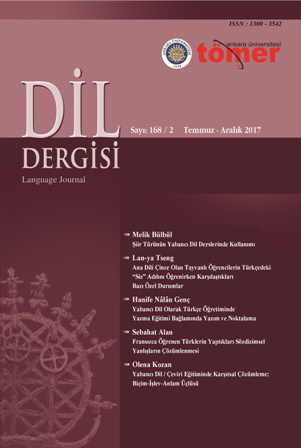Yabancı Dil / Çeviri Eğitiminde Karşıtsal Çözümleme: Biçim-İşlev-Anlam Üçlüsü
Contrastive Analysis in Foreign Language Education and Translation Training: Triad of Form-Function-Idea
Author(s): Olena KozanSubject(s): Language studies, Language and Literature Studies, Foreign languages learning, Comparative Linguistics, Eastern Slavic Languages, Translation Studies
Published by: Ankara Üniversitesi TÖMER
Keywords: Russian; Foreign Language Education; Translation Training; Contrastive Analysis; Non-Restrictive Clause With Conjunction ‘Kotoriy’;
Summary/Abstract: The article deals with the contrastive analysis based on the triad of form-function-idea and highlights the applicability of the approach as for Turkish-Russian language pair. A notion of ‘semantic consciousness’ aimed as a result of applying contrastive analysis is introduced and the importance of the notion in the foreign language education and translation training is underlined. Semantic consciousness aims at students’ comprehension of the beyond-the-language semantic ideas behind the grammatical structures and the ability of the semantic ideas to rearrange itself differently in different languages. ‘From idea to form’ approach applied ın the framework of semantic consciousness acquisition process is shortly introduced. Contrastive analysis of non-restrictive clause with ‘kotoriy’ in Russian and its functional equivalent in Turkish, known as an adjective clause, is provided as an example.
Journal: Dil Dergisi
- Issue Year: 168/2017
- Issue No: 2
- Page Range: 65-81
- Page Count: 17
- Language: Turkish

